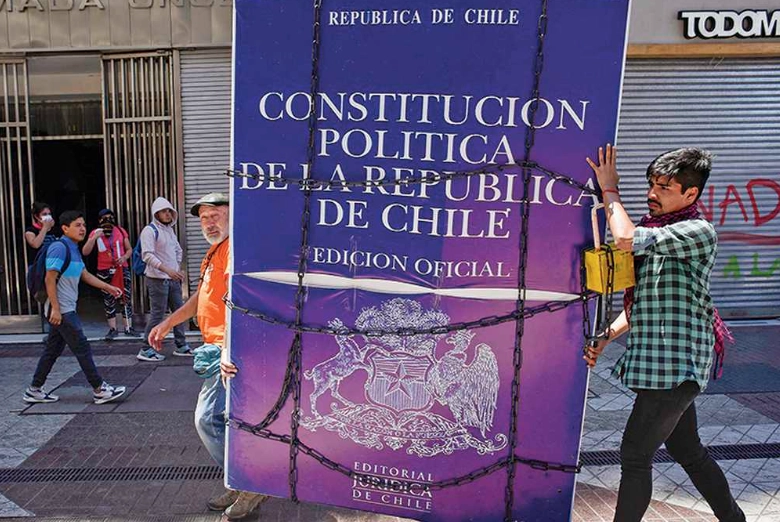The process of creating a new constitution in Chile is important not only for the Chilean society, but for the whole region. If the proposal is finally approved in the “ending” plebiscite of September 4, 2022, this constitution would join the other new constitutions of the region, such as the one approved in Venezuela in 1999, in Ecuador in 2008, and in Bolivia in 2009. However, the case of Chile presents some peculiarities.
First, since its transition to democracy in 1989, Chile has maintained relative political stability, especially when compared superior to most countries in the region. It was not until 2019, when there were massive protests in the country, that high levels of social dissatisfaction became evident, particularly with the economic system.
Second, Chile is one of the few countries whose population has maintained a medium to a high degree of satisfaction with democracy. According to Latinobarómetro data from between 1995 and 2020, preference for democracy has consistently outpaced preference for authoritarianism in Chile. Third, although Chile has maintained the 1980 Constitution of Pinochet’s design, in 2005 its elites realized how to best adapt it to democracy. But that model seems to be exhausted, and in October 2020 the majority of Chileans (78%) voted to create a new constitution. In May 2021, the Constitutional Convention was elected.
While the processes in Venezuela, Ecuador, and Bolivia were strongly influenced by populist leaderships, in Chile there is a plurality of actors involved, although there is a clear left-leaning majority. In this context, the advantage of voting for the “rejection” of the ratification plebiscite is worrisome.
A constitution is essentially a pact to ensure rights, distribute obligations, and organize relations between powerful groups that at a certain moment dispute the hegemony of politics. There are constitutions that last over time, and others that do not. There are those that are efficient, and others that become just words on paper. Democratic constitutions are not the same as those that sustain non-democratic regimes. Written constitutions, unlike their unwritten counterparts that are typical of the common law tradition, must adapt with the passing of time. Either they adapt or they must be replaced outright.
Constitutions are the space where the different elements of power measure their strengths within political systems. Therefore, the institutional design embodied in a constitution is fundamental and must favor a balance between adequate political representation and efficient governance of the system.
If representation is favored over governance, situations of instability are created, and if governance is favored over representation, an inflexible system is generated. In the long run, both situations lead to the delegitimization of the political regime. The success of democratic and written constitutions does not necessarily depend on their origin, or whether they were drafted democratically; it depends on whether the principles they postulate are universal and whether the citizenry internalizes them.
Regardless of how democratic the Constitutional Convention has been, it seems that there was not an in-depth diagnosis of what the Chilean citizenship has expressed, and the absence of this is leading to the creation of a constitution that is not very innovative. According to Latinobarómetro 2020, there is a growing societal discomfort with the Government, regardless of its political affiliation. More than 70% of those surveyed have little interest in politics, and the President, the Judiciary, the Congress, and the political parties, in that order, are the institutions that generate the least confidence.
But the draft confirms presidentialism as the country’s form of government, as if there was no dissatisfaction with this system. The new constitution creates a limited presidency controlled by several autonomous bodies, an asymmetric bicameral Legislative, in which the Chamber of Deputies practically monopolizes the creation of laws. It also conditions the results of votes in the Chamber of Regions (the Upper Chamber) to the effect that, when its vote is negative with respect to what is approved in the Lower Chamber, the result may still be submitted to a joint commission of both chambers “to resolve discrepancies”.
Many state functions are over-regulated in the draft. This would be solved if the principles were well established and clearly required to be applied in the secondary laws. However, by placing fundamental and regulatory issues at the same constitutional level, what is generated is institutional inflexibility, and this may open the door to undemocratic solutions. The recent history of Peru, which by parliamentarizing its presidential system generated an extremely unstable system, should have been an example that was considered by the members of the Convention.
While the current Constitution has 147 articles, the draft proposal contains 499 that, when taken together, propose a quasi-liberal constitution because it makes distinctions between groups of people. While it assumes the values of freedom and equality, it leaves ample room for contradiction.
The proposed constitution is also quasi-democratic because the idea of democracy itself is incorrectly adjectivized and lacks a taxonomic categorization, as it is not clear whether democracy is thought of as a genus or a species. For example, the term “representative democracy” does not appear once, but the entire institutional design for the country is precisely that of a representative democracy.
On the other hand, the word “equality” or “parity” appears 36 times, “plurinational” 18 times, “democracy” and “democratic” 40 times, “participation” 140 times, “representation” and its derivations 73 times, while the term “political parties” only appears 4 times and in a prohibitive manner. In many cases, what is postulated as a principle appears as a noun, other times as an adjective, and other times as a verb. Thus, this creates contradictions with other terms, sometimes even in the same paragraph.
The draft constitution still needs to be harmonized, and on July 4 it should be delivered, but the problem is that the seeds of disenchantment has been sown. If the draft was finally approved by a simple majority, it would be an imposition for the rest of the citizenship. It would be a serious setback with unforeseeable consequences. So far, polls show that this is not the constitution desired by Chilean society, so if it is rejected, a historic opportunity will also have been lost.
Translated from Spanish by Alek Langford











